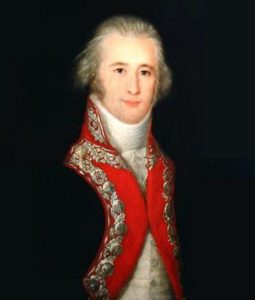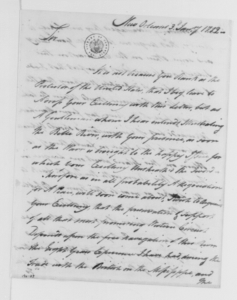North Americans
Featured Biography: Oliver Pollock
Oliver Pollock, another under-publicized hero of the American Revolution, decidedly didn’t lead a ‘ho-hum’ life. An Irish immigrant who risked his personal fortune to aid the American Revolution in the western and southern battlefields, he rode with Bernardo de Gálvez in his campaign against the British, smuggled weapons and supplies to the Continental Army, and tumbled from entrepreneurial success to debtor’s prison.
After initially immigrating to the hotbed of colonial activism, Pennsylvania, Pollock’s international merchant ventures took him south to Spanish Louisiana and the Caribbean. Pollock was well acquainted with one of Spanish King Carlos III’s trusted  generals, Irishman Alejandro O’Reilly, whom he met during his business trips to Havana, Cuba. Pollock later became a close friend and ally of Bernardo de Gálvez, and assisted him in the southern campaign in Louisiana and Alabama in 1781. He also funded George Rogers Clark, brother of the explorer in the Louis and Clark expedition, who fought against the British in the western states along the Mississippi. (Image of General Alejandro O’Reilly)
generals, Irishman Alejandro O’Reilly, whom he met during his business trips to Havana, Cuba. Pollock later became a close friend and ally of Bernardo de Gálvez, and assisted him in the southern campaign in Louisiana and Alabama in 1781. He also funded George Rogers Clark, brother of the explorer in the Louis and Clark expedition, who fought against the British in the western states along the Mississippi. (Image of General Alejandro O’Reilly)
Pollock began assisting the North American rebels in 1776. Continental Army General Charles Lee sent emissaries directly to the Spanish in New Orleans a few months after the Declaration of Independence was signed in 1776, to request assistance to fight the British. Gunpowder was desperately needed, and there were almost no domestic supplies at the outbreak of the war. The requested supplies were provided by Governor Luis de Unzaga, and brokered by Oliver Pollock. Lee’s officers quickly moved the supplies to the Continental troops, distributing most of the powder up the Mississippi River to defend Forts Pitt and Wheeling, and the remainder to the embattled capital of Philadelphia.
When Gálvez succeeded the retired Unzaga in1777, Pollack was introduced as a man who could be trusted. Gálvez, with Pollock as broker, supplied the North Americans rebels in the western campaigns further up the Mississippi, and shipped supplies further east to the Continental Army.
In January 1778, Governor Patrick Henry authorized an expedition by George Rogers Clark. Clark captured the British fort at Vincennes and secured the northern region of the Ohio. Clark also became acquainted with several other Spaniards in the region, including Fernando de Leyba, the lieutenant governor of upper Louisiana who actively supported the American cause.
The credit lines that Pollock established to purchase weapons, ammunition, and provisions for Clark were supposed to be backed by the state of Virginia. In reality, Pollock had to rely on his own personal credit and on Gálvez, who allowed the funds of the Spanish government to be at Pollock’s disposal as loans. These funds were delivered in the darkness of night by Gálvez’ private secretary.
When Spain formally declared war on the British in 1779, Bernardo de Gálvez organized an army to challenge the British. The campaign began in New Orleans. Oliver Pollock rode as a volunteer with Bernardo de Gálvez, assisting him to negotiate the surrenders of vital British forts along the Mississippi. The Spanish and their allies captured Fort Bute at Manchac on September 6, and continued their march along the Gulf Coast towards Florida.
Their next two victories were achieved with the diplomatic assistance of Oliver Pollock. Pollock had corresponded a month earlier with George Rogers Clark stating his belief that the Natchez inhabitants were in favor of the North Americans and Spanish, and would join them when offered an opportunity. Pollock sent a letter to the inhabitants, informing them of Spain’s declaration of war and urging the inhabitants to give up the Fort. The diplomacy and personalities of Pollock and Gálvez prevailed, and the Fort was surrendered. The Spanish campaign had succeeded in the initial sweep of the south.
Their success stunned the British. General Campbell initially refused to believe the reports, thinking they were a ploy to lure the British out of the strong fortifications of Pensacola. The British in San Augustín also panicked at the implication of a Spanish attack, and importantly for the Continental Army, requested more troops from General Clinton.
 This welcome news reached a weary General Washington in a report sent by Juan de Miralles, the Spanish agent residing in Philadelphia. Miralles also advised Washington that the Spanish would soon move against Mobile, Alabama. (Image of correspondence between Oliver Pollock and General George Washington, available at LOC.gov; sorry, couldn’t locate a portrait of Oliver.)
This welcome news reached a weary General Washington in a report sent by Juan de Miralles, the Spanish agent residing in Philadelphia. Miralles also advised Washington that the Spanish would soon move against Mobile, Alabama. (Image of correspondence between Oliver Pollock and General George Washington, available at LOC.gov; sorry, couldn’t locate a portrait of Oliver.)
Oliver Pollock continued to assist the North Americans by providing military supplies for the Continental Army throughout the Revolutionary War. His later years were deeply troubled by personal financial misfortune as Congress delayed repayment of the debts that he incurred for the Continental Army. After the Revolution, he was jailed for debts and evading customs taxes in Havana. Gálvez secured his release, he traveled back to the United States with the new Spanish Ambassador, Diego de Gardoqui.
